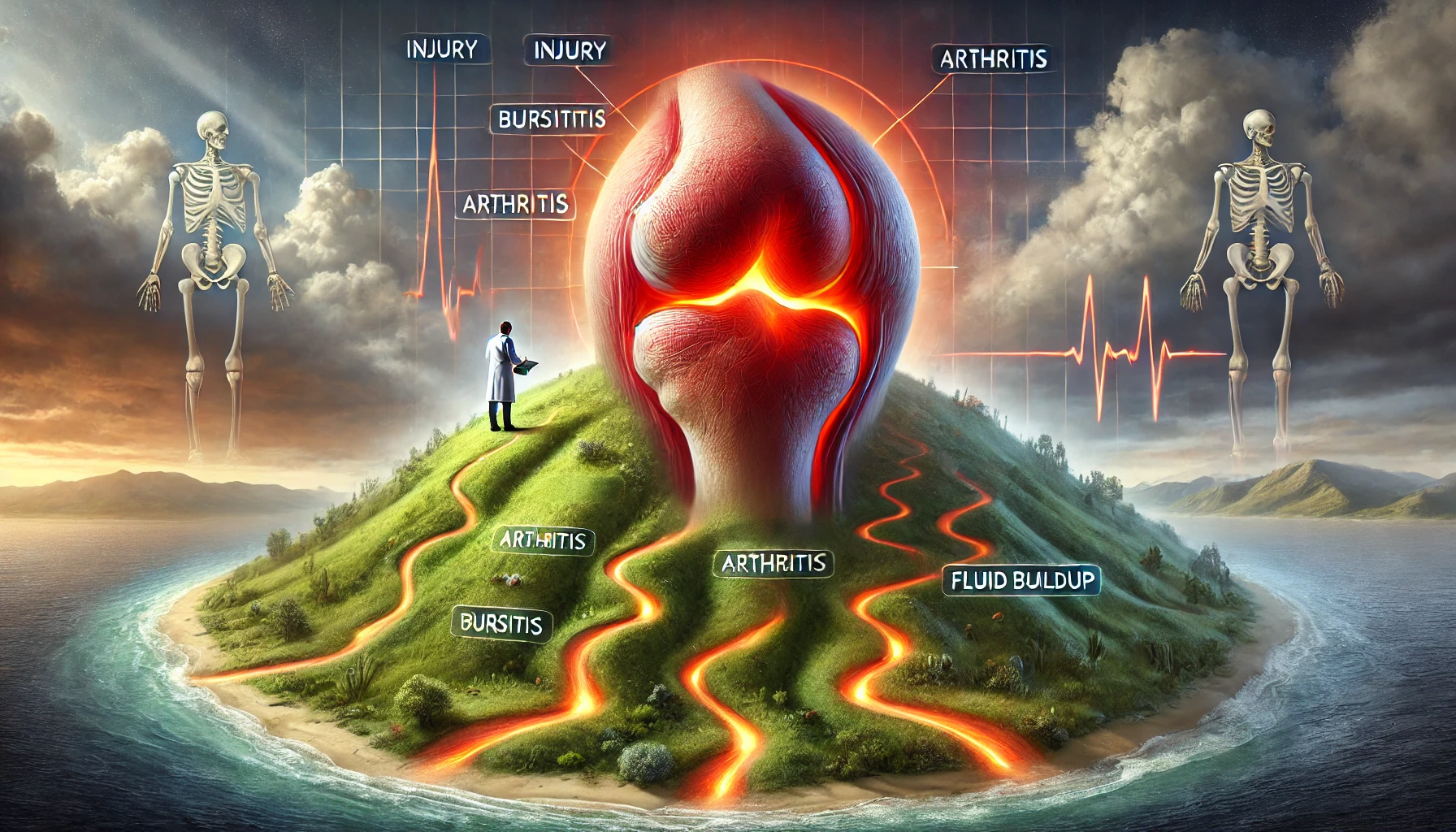As a specialist doctor, I often see patients come in worried about knee swelling. Some have pain, others don’t—but they all have the same question: “Why is my knee swollen?”
I understand how frustrating and uncomfortable a swollen knee can be. Whether it appeared suddenly or developed over time, knee swelling is a sign that something isn’t right. In this article, I’ll explain the common causes, share my personal experience treating patients, and provide practical solutions to help you manage the swelling effectively.
What Causes a Swollen Knee?

Swelling in the knee happens when excess fluid builds up inside or around the joint. This can be due to injuries, medical conditions, or even lifestyle factors. Let’s break down the most common reasons.
1. Injury or Trauma
If your knee suddenly swells after an accident, fall, or sports injury, it’s likely due to internal damage. The most common injuries that cause swelling include:
- Ligament tears (e.g., ACL, MCL)
- Meniscus tear (cartilage damage)
- Knee sprains or strains
🔹 Personal Experience: I once treated a basketball player who twisted his knee during a game. His knee swelled immediately, but he thought it was just a minor sprain. An MRI later showed an ACL tear—which required surgery. If your knee swells suddenly after an injury, get it checked!
2. Arthritis (Osteoarthritis or Rheumatoid Arthritis)
Swelling can be a sign of arthritis, especially if it develops gradually over time. The two main types are:
- Osteoarthritis (OA): Wear-and-tear damage to cartilage, common in older adults.
- Rheumatoid arthritis (RA): An autoimmune condition that causes inflammation in the knee.
Many arthritis patients I see have morning stiffness, swelling, and occasional flare-ups. If your knee swells frequently and feels stiff, arthritis could be the culprit.
3. Bursitis (Inflamed Knee Bursae)
The knee contains small fluid-filled sacs called bursae that reduce friction. When these become inflamed (a condition called bursitis), the knee can swell significantly.
🔹 Personal Experience: A patient of mine, who worked as a plumber, developed prepatellar bursitis from kneeling too much. His knee was swollen but not very painful. With rest and anti-inflammatory treatment, the swelling improved in a few weeks.
4. Knee Effusion (Water on the Knee)
Sometimes, fluid builds up inside the knee joint for no obvious reason. This is called knee effusion or “water on the knee.” It can happen due to mild irritation, infections, or underlying conditions.
Also Read: Knee Problems Walking – Causes, Treatment, and My Expert Advice!
5. Baker’s Cyst
A Baker’s cyst is a fluid-filled swelling that develops behind the knee. It’s often linked to arthritis or a previous knee injury. Some people don’t even notice it until the cyst gets large enough to cause discomfort.
6. Infection (Septic Arthritis)
If your knee is swollen, red, warm, and painful, it could be infected. Septic arthritis is a medical emergency and needs immediate treatment.
🚨 When to Seek Emergency Help: If you have fever, severe pain, and redness along with knee swelling, go to a doctor immediately.
7. Gout or Pseudogout
Both conditions cause sudden swelling due to crystals forming inside the knee joint:
- Gout: Caused by uric acid buildup (linked to diet and kidney function).
- Pseudogout: Caused by calcium crystal deposits in the joint.
I’ve had patients walk into my clinic with a very swollen, red knee that appeared overnight—often due to gout. A simple joint fluid test can confirm the diagnosis.
How to Treat a Swollen Knee

The right treatment depends on the cause. However, in most cases, these general approaches help reduce swelling and discomfort.
1. Try the R.I.C.E Method
For sudden swelling, I always recommend the R.I.C.E. method:
✅ Rest – Avoid putting too much pressure on the knee.
✅ Ice – Apply an ice pack for 15-20 minutes every few hours.
✅ Compression – Use a knee brace or wrap to reduce swelling.
✅ Elevation – Keep your knee raised to prevent fluid buildup.
2. Take Anti-Inflammatory Medications
Over-the-counter medications like ibuprofen or naproxen can help reduce swelling. However, if you have underlying health conditions, check with your doctor first.
3. Use Gentle Movement and Stretching
If the swelling isn’t due to a serious injury, gentle stretching and strengthening exercises can improve circulation and reduce stiffness. Avoid high-impact activities like running until the swelling subsides.
🔹 Personal Tip: I often recommend low-impact exercises like cycling or swimming for patients with recurring knee swelling.
4. Consider Weight Management
Excess weight puts extra pressure on the knee joint, leading to more fluid buildup and swelling. Losing even a small amount of weight can significantly reduce knee problems.
5. Drainage (For Severe Cases)
If swelling persists, a doctor may drain the fluid from your knee using a simple procedure called joint aspiration. This provides immediate relief and helps diagnose the cause.
When Should You See a Doctor?
Most cases of knee swelling are not emergencies, but you should seek medical help if:
🚨 The swelling appears suddenly after an injury
🚨 Your knee is red, hot, or extremely painful (sign of infection)
🚨 The swelling does not improve within two weeks
🚨 You have difficulty walking or moving your knee
🚨 There is frequent or recurring swelling
Ignoring a swollen knee can lead to joint damage or chronic pain, so it’s best to get it checked if it doesn’t improve.
FAQ’s
1. What causes knee swelling?
Knee swelling can be caused by injuries, arthritis, bursitis, infections, or fluid buildup (knee effusion).
2. Should I be worried if my knee is swollen?
If the swelling is severe, painful, red, or lasts more than two weeks, see a doctor.
3. How can I reduce knee swelling at home?
Use the RICE method (Rest, Ice, Compression, Elevation) and take anti-inflammatory medications if needed.
4. Can arthritis cause knee swelling?
Yes, both osteoarthritis and rheumatoid arthritis can cause fluid buildup and swelling in the knee.
5. When should I see a doctor for a swollen knee?
See a doctor if your knee is very swollen, painful, red, warm, or difficult to move.
Final Thoughts: Why Is My Knee Swollen?
A swollen knee is your body’s way of signaling a problem—whether it’s an injury, arthritis, or an underlying medical condition. Some cases resolve with rest, while others require medical attention. From my experience, early treatment and proper knee care make a big difference. If your knee is swollen, pay attention to other symptoms, follow the recommended treatments, and don’t hesitate to see a doctor if needed.
Related Post
- Zimatejigemo – Unlocking the Fusion of Creativity, Identity, and Innovation!
- Tinaypimatelate – The Revolutionary Concept Shaping the Future of Innovation!
- Limhuloxidpov – A Complete Guide to Understanding This Unique Concept!
- Zaxtexporoz – Exploring the Emerging Concept of Innovation and Digital Transformation!
- Lekulent – The Breakthrough Wellness Solution Taking the Health World by Storm!






